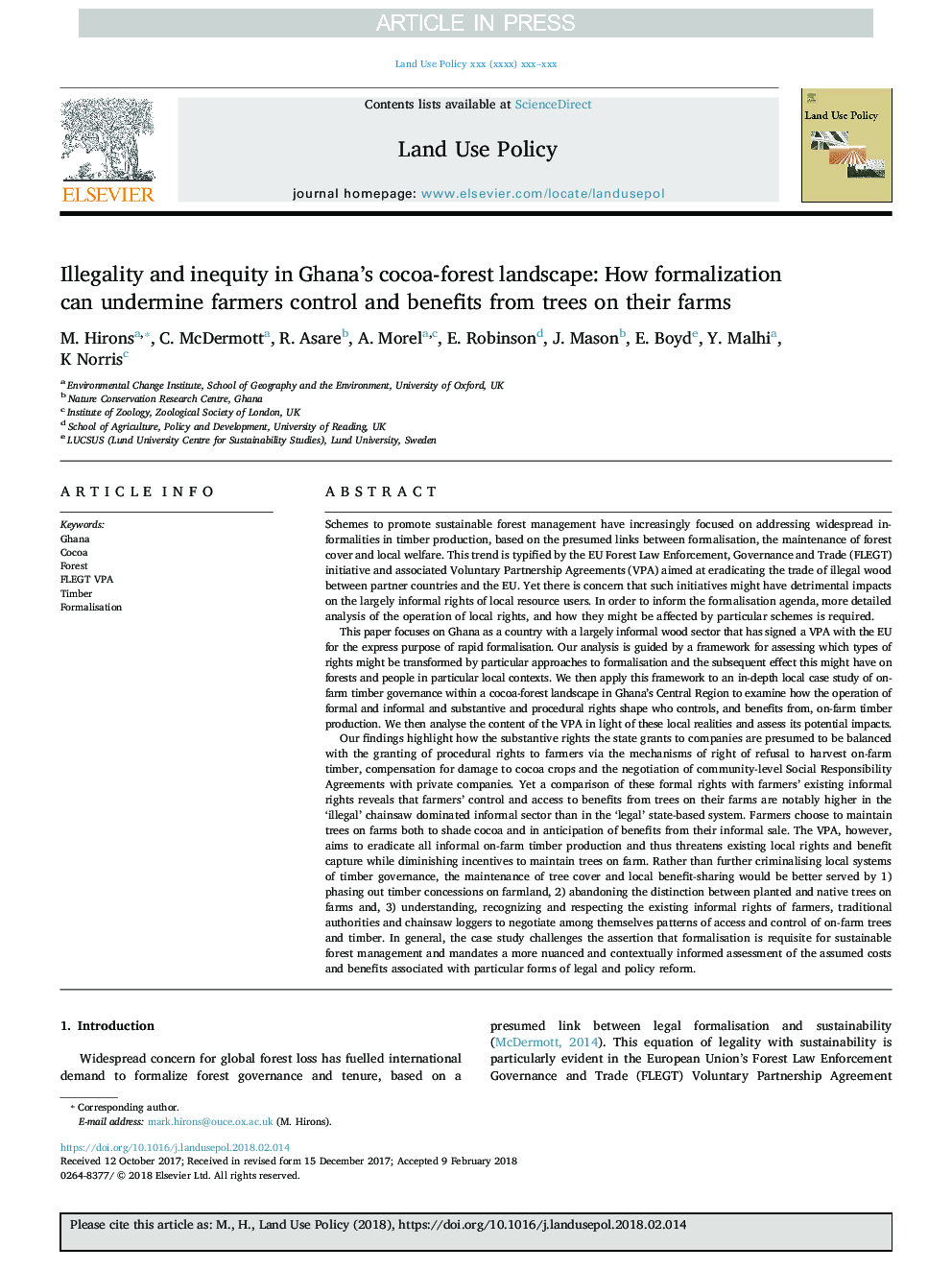| کد مقاله | کد نشریه | سال انتشار | مقاله انگلیسی | نسخه تمام متن |
|---|---|---|---|---|
| 6546282 | 1421807 | 2018 | 9 صفحه PDF | دانلود رایگان |
عنوان انگلیسی مقاله ISI
Illegality and inequity in Ghana's cocoa-forest landscape: How formalization can undermine farmers control and benefits from trees on their farms
ترجمه فارسی عنوان
غیرقانونی بودن و ناسازگاری در منظر جنگل کاکائو غنا: چگونه رسمی شدن می تواند کنترل و مزایای کشاورزان را از درختان در مزارع خود تضعیف کند
دانلود مقاله + سفارش ترجمه
دانلود مقاله ISI انگلیسی
رایگان برای ایرانیان
ترجمه چکیده
یافته های ما نشان می دهد که چگونه حقوق مادی را که دولت برای شرکت ها ارائه می دهد، با اعطای حقوق رویه ای به کشاورزان از طریق مکانیسم حق ازدواج در زمینه مزرعه در مزرعه، جبران آسیب به محصولات کاکائو و مذاکره با جامعه، متعادل است. سطوح موافقت نامه مسئولیت اجتماعی با شرکت های خصوصی. با این حال مقایسه این حقوق رسمی با حقوق غیر رسمی موجود کشاورزان نشان می دهد که کنترل کشاورزان و دسترسی به مزایای درختان در مزارعشان به طور مشخص در بخش غیر رسمی غلط «غیر قانونی» بیش از سیستم مبتنی بر دولت «قانونی» بالاتر است. کشاورزان انتخاب می کنند درختان را در مزارع نگهداری کنند تا به سایه کاکائو و پیش بینی مزایای فروش غیر رسمی خود بپردازند. با این حال، واحدهای تولیدی هدف، ریشه کن کردن همه تولیدات غیر رسمی در مزرعه است و به همین ترتیب حقوق محلی موجود را تهدید می کند و ضمانت را برای کاهش درختان در مزرعه کاهش می دهد. به جای جریمه بیشتر سیستم های محلی مدیریت حکومتداری، نگهداری از پوشش درخت و به اشتراک گذاری منافع محلی بهتر خواهد بود: 1) لغو امتیازات کشاورزی در زمین های کشاورزی، 2) ترک تمایز بین درختان کاشته شده و بومی در مزارع، 3) درک، شناخت و احترام به حقوق غیررسمی موجود کشاورزان، مقامات سنتی و دامپزشکان اره برقی برای درک الگوهای دسترسی و کنترل درختان و چوب درختان در میان خود. به طور کلی، مطالعه موردی، این ادعا را مورد چالش قرار می دهد که رسمیت بخش بودن برای مدیریت جنگل های پایدار ضروری است و ارزیابی دقیق تر و متقابلا آگاهانه از هزینه ها و منافع احتمالی مرتبط با اشکال خاص اصلاحات قانونی و سیاستی را اعطا می کند.
موضوعات مرتبط
علوم زیستی و بیوفناوری
علوم کشاورزی و بیولوژیک
جنگلداری
چکیده انگلیسی
Our findings highlight how the substantive rights the state grants to companies are presumed to be balanced with the granting of procedural rights to farmers via the mechanisms of right of refusal to harvest on-farm timber, compensation for damage to cocoa crops and the negotiation of community-level Social Responsibility Agreements with private companies. Yet a comparison of these formal rights with farmers' existing informal rights reveals that farmers' control and access to benefits from trees on their farms are notably higher in the 'illegal' chainsaw dominated informal sector than in the 'legal' state-based system. Farmers choose to maintain trees on farms both to shade cocoa and in anticipation of benefits from their informal sale. The VPA, however, aims to eradicate all informal on-farm timber production and thus threatens existing local rights and benefit capture while diminishing incentives to maintain trees on farm. Rather than further criminalising local systems of timber governance, the maintenance of tree cover and local benefit-sharing would be better served by 1) phasing out timber concessions on farmland, 2) abandoning the distinction between planted and native trees on farms and, 3) understanding, recognizing and respecting the existing informal rights of farmers, traditional authorities and chainsaw loggers to negotiate among themselves patterns of access and control of on-farm trees and timber. In general, the case study challenges the assertion that formalisation is requisite for sustainable forest management and mandates a more nuanced and contextually informed assessment of the assumed costs and benefits associated with particular forms of legal and policy reform.
ناشر
Database: Elsevier - ScienceDirect (ساینس دایرکت)
Journal: Land Use Policy - Volume 76, July 2018, Pages 405-413
Journal: Land Use Policy - Volume 76, July 2018, Pages 405-413
نویسندگان
M. Hirons, C. McDermott, R. Asare, A. Morel, E. Robinson, J. Mason, E. Boyd, Y. Malhi, K Norris,
